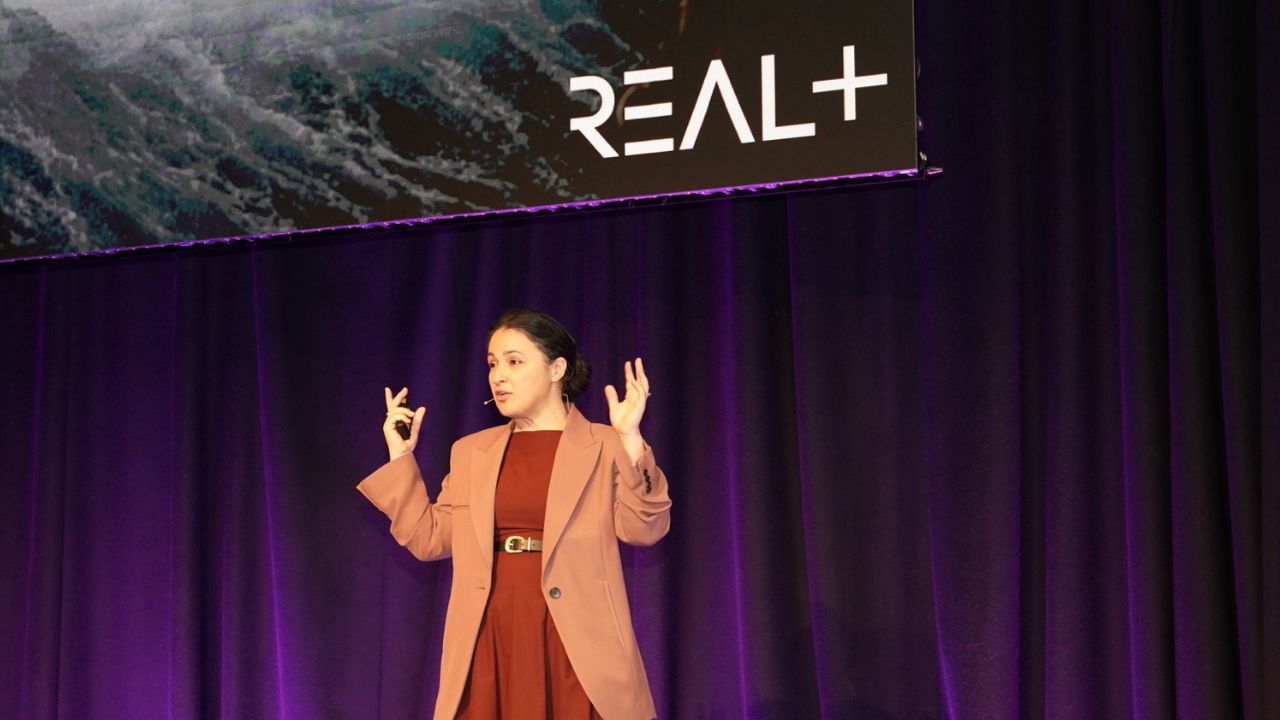As a coach and consultant at REAL+, Samantha Macri spends her time inside property management businesses across the country.
She sees the good, the bad, and the deeply dysfunctional.
And from that unique vantage point, she brought a clear message to the room: the industry is shifting – and if property managers want to keep their ships afloat, they need to embrace change, not resist it.
“I’m a firm believer that a smooth sea never made a skilled sailor,” she said.
“And property managers, you’re all sailors. Maybe even pirates.”
The metaphor set the tone for what followed: a candid assessment of the industry’s challenges and four core strategies for riding the current rather than being capsized by it.
First, she addressed leadership. Too often, Samantha said, business owners and team leaders confuse their role with being the building itself: solid, immovable, all-knowing.
But that’s not sustainable, and it’s not what teams actually need.
“You are not the building,” she told them. “The building is your business’s values. You don’t have to be perfect, or have all the answers. You just need to be the lighthouse.”
The lighthouse, she explained, represents clarity and direction.
“Your values are the structure. Your light is what your team follows. And if that light goes out—if your values aren’t maintained—people get lost.”
For Samantha, strong leadership isn’t about knowing everything. It’s about being visible, being human, and being willing to grow. And, critically, it’s about communication.
The second challenge she raised was resistance to change, particularly legislative change.
Property managers, she noted, are notorious for wanting to stick with what they know.
“If I had a dollar for every PM who said, ‘I’ll just do it the way I’ve always done it,’ I’d be rich.”
But in a landscape shaped by political decisions, economic shifts and social trends, staying still is not an option.
“Storms happen whether you like them or not,” she said.
“You have to watch the horizon. Read the news. Make a plan.”
She pointed to an agency that hosted an information night for landlords ahead of a major legislation shift.
“They knew their clients were scared. So they got proactive. They said, ‘Let’s talk about it.’ That’s what using the storm to your advantage looks like.”
Samantha’s third pillar was conflict: and her take was that the issue isn’t usually the conflict itself, but the mismatch in expectations that causes it.
“I love conflict resolution training, but I always want to ask, why is there conflict in the first place?”
She cited the final bond inspection as a textbook example.
“Tenants think, ‘I’ve lived here five years, it smells like socks, I’m done, give me my bond.’ Owners expect the property back in pristine condition. Both think they’re right.”
The solution, she said, is simple: close the expectation gap.
“It’s not magic. It’s process. Say it with your mouth. Call the landlord and ask, ‘When’s the last time you did work on the property?’ If they’ve accepted something during a routine inspection, they’ll expect you to accept it at final.”
And when dealing with either party, Samantha urged PMs to shift their mindset from conflict to collaboration.
“You’re not going to fix the 20 per cent of people who are just difficult. But you can reduce the rest of the conflict just by reframing the conversation.”
Finally, she turned her attention to the bigger picture: where the industry is heading.
And her message was clear – the tide is turning.
“Busy work is out. Relationships are in,” she said.
“The tide that’s coming in is about connection, community, and relationship equity.”
While technology, automation and AI will increasingly take care of admin tasks, what will remain—and what will matter- is how well property managers know their clients, how well they’re trusted, and how deep the rapport goes.
Samantha urged the room to invest in those relationships now, before the tide comes in.
“That’s what’s going to lift your boat.”
But she also challenged leaders to look deeper—beneath the surface issues to what she called the “undercurrent” in their business.
“Sometimes I walk into an office and everything looks fine on top, but nothing’s working. Processes aren’t followed. Culture is toxic. Staff keep leaving. And I have to ask, what’s underneath that?”
Is it fear of change? A clunky business model? Exhaustion?
Whatever it is, she said, that undercurrent has to be identified and addressed before any storm navigation can begin.
Because in the end, property management isn’t going to get easier.
But that’s part of what makes it worthwhile.
“Like sailing, it’s fun because it’s challenging,” she said. “And when you use your expertise and keep learning, you can do something amazing.”

